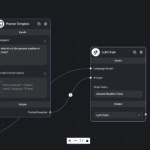In 2023, the integration of cutting-edge AI into educational systems is ushering in a transformative era in learning and teaching. In this article, we’ll explore the profound impact of advanced AI on education and the remarkable possibilities it offers.
Transformative Implications of AI-Driven Personalized Learning
Implementing AI-driven personalized learning systems can have transformative implications for education:
- Democratizing Access: AI-driven personalized learning can make high-quality, tailored education accessible to students from diverse backgrounds, reducing the barriers associated with specialized tutors or expensive educational resources.
- Improved Educational Outcomes: Personalized learning experiences can lead to more effective skill development and better overall educational outcomes, empowering students to excel in their chosen fields.
- Enhanced Educator Efficiency: AI-driven personalized learning can automate aspects of teaching and learning, reducing administrative burdens and allowing educators to focus on providing individualized support and fostering deeper connections with students.
- Self-Paced and Individualized Learning at Scale: Everyone learns differently, and everyone learns at their own pace. AI allows for students to work towards mastery without the artificial pressures of time-based learning.
These systems can help educators and educational institutions become more efficient. By automating aspects of the teaching and learning process, AI-driven personalized learning systems can reduce administrative burdens and free up educators to focus on providing individualized support to their students.
1. Hyper-Intelligent Personalized Learning
With advanced AI, personalized learning becomes hyper-intelligent. This AI can not only assess a student’s academic performance and learning style but also understand their emotions and motivations. It tailors lessons in real-time, adapting to each student’s unique needs and emotional state. The result is a level of personalization that was once unimaginable, where the AI becomes an almost telepathic tutor, offering insights and guidance perfectly suited to the student’s current state of mind.
2. AI-Enhanced Learning Companions
These intelligent AI-driven systems offer conversational interactions that are empathetic, patient, and capable of fostering curiosity and critical thinking. Students can engage in deep discussions, ask questions, or seek clarification at any time. These companions act not just as educational aids but as mentors, providing emotional support and guidance.
3. Immersive Learning Environments
With the power of advanced AI, education goes beyond traditional classrooms. Virtual and augmented reality (VR and AR) become highly sophisticated tools for creating immersive learning environments. Students can walk through historical events, explore the universe, or dissect virtual organisms. The AI enriches these environments with real-time insights, turning learning into an unforgettable adventure.
4. AI-Powered Career Forecasting
Advanced AI is revolutionizing career counseling. It not only assesses a student’s skills and interests but also analyzes the global job market and emerging trends. The AI provides highly accurate recommendations for future career paths, taking into account the rapidly evolving job landscape. Career counseling becomes more data-driven and relevant than ever.
5. Ultra-Smart Content Creation
Educators in 2023 can rely on AI for creating content that is not just informative but deeply engaging. The AI can generate a wide array of educational materials, from written content to videos and even immersive simulations. This revolutionizes the creation of learning resources, allowing educators to focus on facilitating discussions, fostering creativity, and nurturing students’ individual talents.
6. Augmented Institutional Intelligence
Educational institutions leverage advanced AI for comprehensive data analysis. This AI can predict institutional trends, manage resources efficiently, and provide insights for curriculum development. The deep analytics capabilities help institutions adapt to the evolving needs of students and the job market.
7. Evolved Assessment Methods
Advanced AI transforms the way assessments are conducted. Adaptive testing reaches new heights, with AI customizing questions not just for knowledge evaluation but also for critical thinking, creativity, and complex problem-solving. Beyond tests, AI can evaluate qualities that are often hard to quantify, such as leadership, teamwork, and adaptability.
8. Lifelong Learning Ecosystems
In 2023, AI fosters the creation of lifelong learning ecosystems that empower individuals to continually update their skills and knowledge. The AI recommends personalized learning pathways, taking into account an individual’s goals, job market dynamics, and changing skill requirements. These ecosystems ensure that everyone has the opportunity to stay relevant in a rapidly evolving world.
Conclusion
The impact of advanced AI on education in 2023 is nothing short of revolutionary. This AI is reshaping education in ways previously unimaginable. However, the responsible integration of AI in education requires addressing ethical considerations, ensuring data privacy, and providing educators with proper training and support.
In conclusion, advanced AI doesn’t replace educators; it elevates them to new heights and redefines the learning experience. The future of education in 2023 is exceptionally intelligent, deeply personalized, and accessible to all, thanks to the unparalleled capabilities of advanced AI.
With these groundbreaking possibilities, we are not merely educating students; we are preparing them to excel in a world where knowledge is infinite, where learning knows no bounds, and where the pursuit of understanding is a journey of endless possibilities.
References
AI-Powered Personalized Learning:
- AI-Powered Personalized Learning: A Game Changer for Education | by Alan Smithson
- A New Way to Personalize Learning, Thanks to AI | EdSurge News
- Trends in 2023 — is this (finally) the year of AI, personalization and adaptive learning?
AI-Enhanced Individualized Education:





Leave a Reply